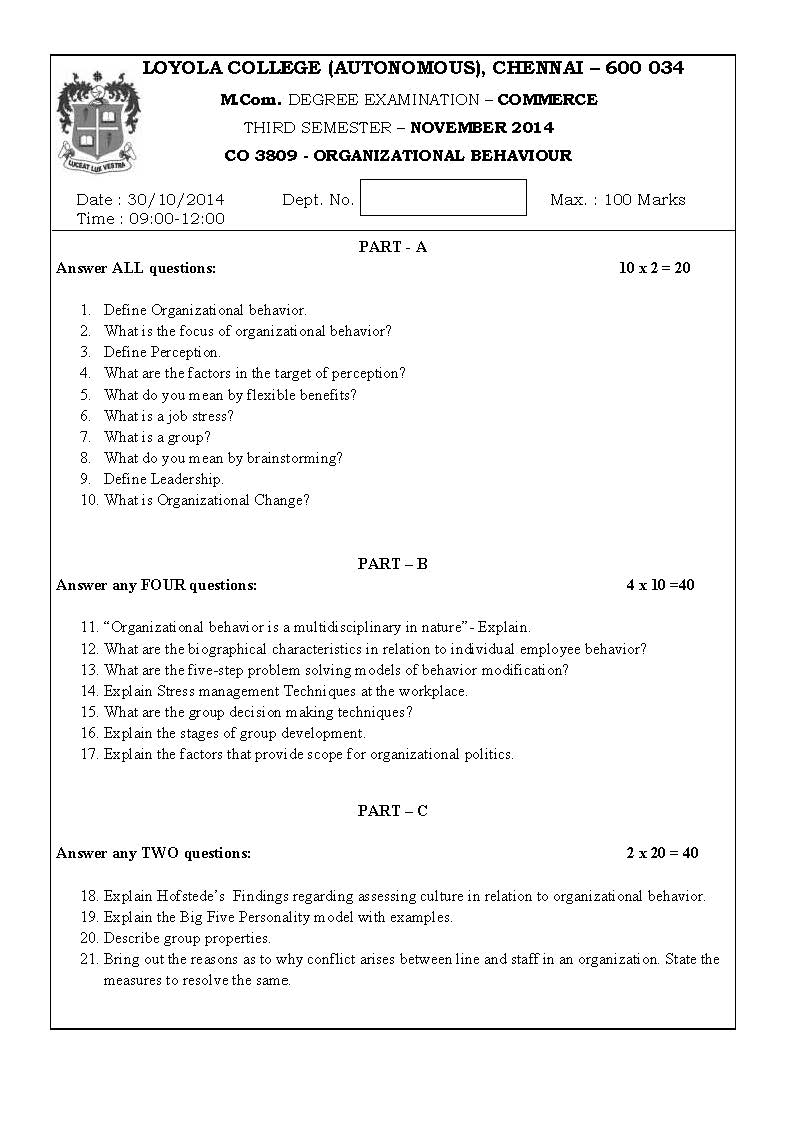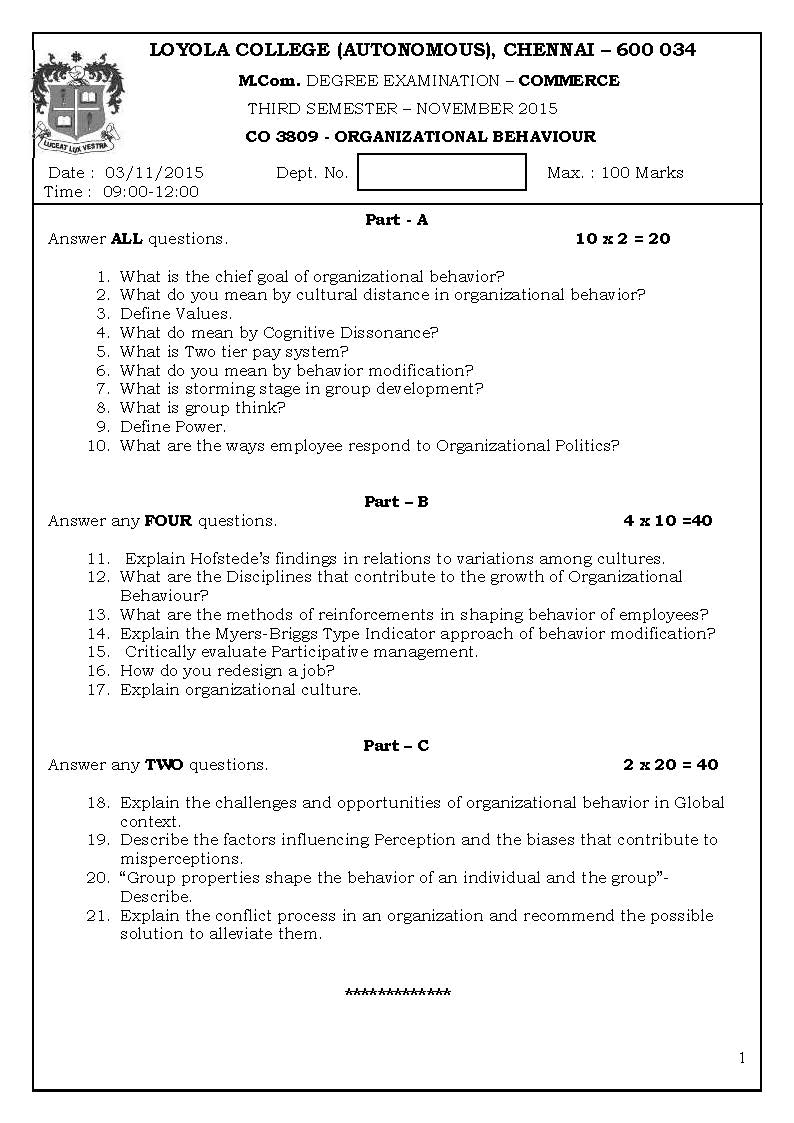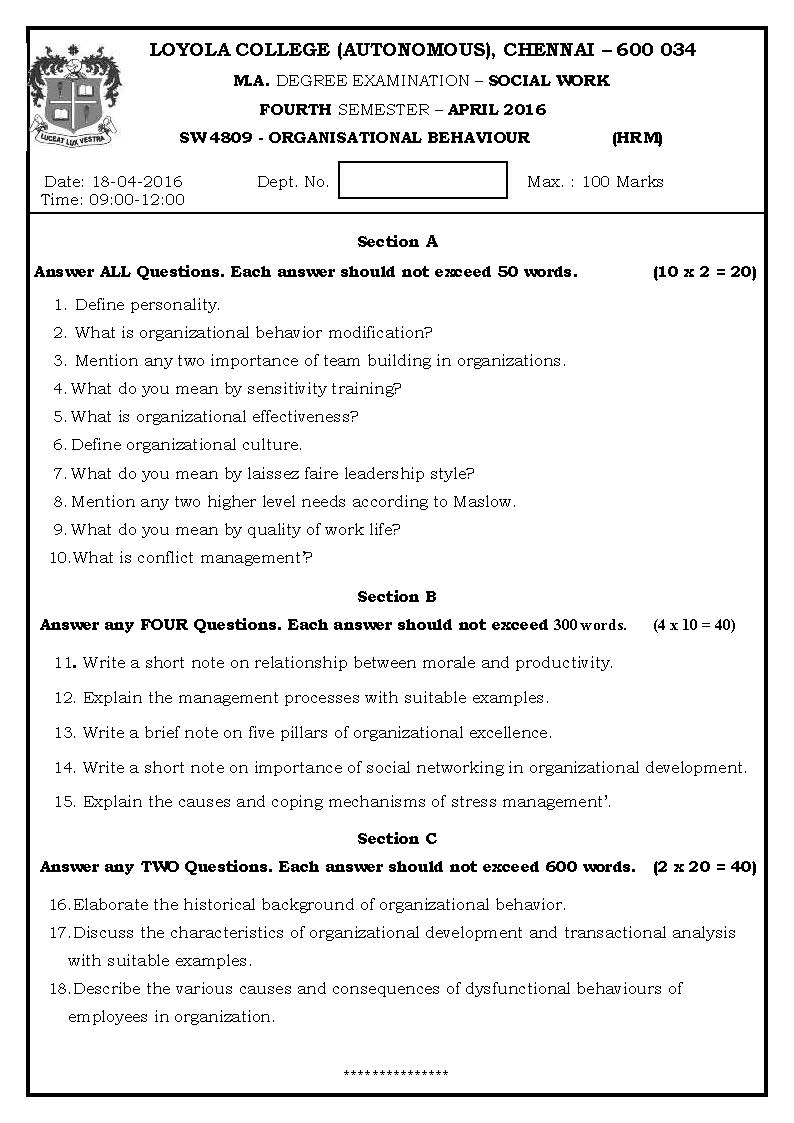Loyola College Organizational Behaviour Question Papers Download
Loyola College M.Com April 2006 Organizational Behaviour Question Paper PDF Download
LOYOLA COLLEGE (AUTONOMOUS), CHENNAI – 600 034
M.Com. DEGREE EXAMINATION – COMMERCE
|
FIRST SEMESTER – APRIL 2006
CO 1809 – ORGANISATIONAL BEHAVIOUR
Date & Time : 25-04-2006/1.00-4.00 P.M. Dept. No. Max. : 100 Marks
PART – A
Explain the following concepts in five lines each. (10 ´ 2 = 20 marks)
- Organizational Behaviour.
- Personality
- Social learning
- Perception
- Cognitive dissonance
- Stress
- Organizational Culture
- Re-freezing
- Power
- Collaborating
PART – B
Answer any FIVE questions. Answer should not exceed 2 pages. (8 ´ 5 = 40 marks)
- To what extent do social sciences influence the study of organizational behaviour?
- How will you measure the climate of an organization?
- Distinguish between groups and teams. Explain the characteristics of a team.
- Explain the various sources of power available to a leader. What are the qualities of a good leader?
- What are the consequences of stress? Explain the various kinds of Stress Management Strategies.
- How are attitudes related to job satisfaction? What are the various factors related to job satisfaction?
- What are the various factors correlated with perception? What strategies would you use for impression management?
- How will you deal with inter group conflict?
PART – C
Answer any TWO questions (Answer should not exceed 4-6 pages each)
(2 x 20 = 40 marks)
- Why is change necessary? What are the external and internal sources of change in an Organization? How will you introduce and manage in your organization?
- What are the characteristics of organizational Behaviour. Explain any organizational behaviour model and also highlight the various variables appearing in that model.
- Explain any three situational theories of leadership. How do leaders use politics in an Organization.
Loyola College M.A. Social Work April 2003 Organizational Behaviour Question Paper PDF Download
LOYOLA COLLEGE (AUTONOMOUS), CHENNAI – 600 034.
M.A. DEGREE EXAMINATION – sociAL WORK
FourTH SEMESTER – APRIL 2003
sW 4961 / sW 1017-2 – ORGANIZATIONAL BEHAVIOUR
11.04.2003
1.00 – 4.00 Max : 100 Marks
PART – A (10´ 2=20 marks)
Answer ALL the questions. Answer to each question not to exceed 50 words.
- Define Organization.
- Name any four concepts drawn by organizational Behaviour from other disciplines.
- What is a micro-perspective of organizational Behaviour?
- Name any four barriers to Communication.
- State the three major approaches to Decision Making.
- Write a short note on OB Mod.
- Differentiate the two main theories of Learning.
- Mention the stages of reacting to stress.
- What is Theory Z?
- List out the five factors identified by Udai Pareekh to be causing frustration.
PART – B (4´ 10=40 marks)
Answer any FOUR. Answer should not exceed 300 words. All questions carry equal
marks.
- Define Organizational Behaviour and explain the importance of studying Organizational Behaviour.
- Explain the concept of Personality and its relevance in an organizational context.
- Group Dynamics and the influences that a group have on its members.
- What is Organization Development? Specify the techniques used for Organization Development.
- Explain the concepts used in Transactional Analysis.
- Discuss the role of a Behavioural Scientist in ensuring Mental Health in the Organizations and in dealing with problems like absenteeism and accidents.
PART – C (2´20=40 marks)
Answer any TWO. Each answer should not exceed 600 words.
- Define Perception and describe the factors affecting perception with examples.
- Describe Leadership and discuss the various theories of leadership and qualities of Leaders.
- Compare and contrast the theories of Motivation.
Loyola College M.A. Social Work April 2004 Organizational Behaviour Question Paper PDF Download
LOYOLA COLLEGE (AUTONOMOUS), CHENNAI – 600 034
MA DEGREE EXAMINATION – SOCIAL WORK
FOURTH SEMESTER – APRIL 2004
SW 4961/SW 1017–2 – ORGANIZATIONAL BEHAVIOR
Date : 05.04.04 Max : 100 marks
Duration : 9 – 12 noon Hours : 3 hrs
SECTION – A
Answer ALL questions. ALL questions carry equal marks. (10 x 2 = 20 marks)
Answer to each question should not exceed 50 words.
- Define Organizational Behavior
- Name any four disciplines that have contributed to the micro and macro perspectives or Organizational Behavior
- Write a note on Attitudes
- Indicate any TWO outcomes of Hawthorne Studies
- What is Kelly’s attribution theory?
- What is Pygmalion Effect?
- What is Learning?
- What are strokes in Transactional Analysis?
- Write a brief note on Work Place Bullying.
- Name any four of the team roles specified by Belbin.
SECTION – B
Answer any FOUR. (4 x 10 = 40 marks)
All Questions carry equal marks. Each answer should not exceed 300 words.
- Outline the nature and causes of organizational stress with suitable remedial measures.
- Explain the relevance of Emotions at Work place with examples.
- Examine the role of behavioral scientist in the industry.
- Compare and contrast any TWO Theories of Motivation.
- Define leadership and explain any four theories of Leadership.
- Explain the concept of Perception and bring out the factors affecting perception.
SECTION – C
All questions carry equal marks. Answer any TWO. (2 x 20 = 40 marks)
Answer to each question should not exceed 600 words.
- What are the various concepts used in the study of Group Dynamics? Explain them with examples.
- Explain the various forms of Power and Political Behavior in an organizational context.
- Define personality. Explain the important theories of Personality with suitable examples.
Loyola College M.A. Social Work April 2007 Organizational Behaviour Question Paper PDF Download
| LOYOLA COLLEGE ( AUTONOMOUS), CHENNAI-600 034 |
| M.A DEGREE EXAMINATION SOCIAL WORK |
| IV SEMESTER-APRIL 2007 |
| Sub. Code . SW4963
Sub.Name: ORGANIZATIONAL BEHAVIOUR |
| Max.Marks: 100 |
SECTON A 10×2=20
Answer all the questions, each not exceeding 50 words.
- Define Organizational Behaviour.
- Who is considered the father of ‘Scientific Management’?
- State the basic assumptions of Organizational Behaviour.
- Differentiate ‘Attitude’ from ‘Values’.
- What is meant by ‘Creativity’?
- Explain ‘Conflict Resolution’.
- What do you mean by Industrial Mental Health?
- Write a note on Power and Politics.
- Contextualize ‘Learning’ in OB.
- Define ‘Behaviour Modification.
SECTION B 4×10=40
Answer any 4 questions each not exceeding 300 words.
- Explain the ‘Organization Models’ with suitable examples.
- ‘Perception is an important cognitive process deciding how a person will behave’. Comment
- Discuss the determinant of Personality.
- Why do employees resist change? How does one overcome such resistance?
- Discuss the role of Behavioural Societies in Industrial Settings
SECTION C 2×20=40
Answer any 2 questions each not exceeding 600 words.
- Explain any TWO theories of Leadership.
- ‘The concept of Motivation occupies a central place in the discipline of OB’. Elucidate.
- Discuss any FOUR techniques of Organizational Development.
Loyola College M.A. Social Work April 2008 Organizational Behaviour Question Paper PDF Download
LOYOLA COLLEGE (AUTONOMOUS), CHENNAI – 600 034
M.A. DEGREE EXAMINATION – SOCIAL WORK
|
FOURTH SEMESTER – APRIL 2008
SW 4963 – ORGANISATIONAL BEHAVIOUR
Date : 23/04/2008 Dept. No. Max. : 100 Marks
Time : 9:00 – 12:00
PART – I
SECTION – A
Answer all questions.
Each answer should not exceed 50 words. 10 x 2 = 20 Marks
- Define Organizational Behaviour
- Write a note on Attitudes.
- What is theory X ?
- List out any four factors that determine Organizational Learning.
- Highlight the five stages of Group development
- List out the informal roles of a team leader
- What are the leadership skills required for managers in modern organizations.
- What is Organizational Excellence?
- Define Transactional analysis
- Write about any four Stress management techniques.
SECTION – B
Answer any Four questions.
Each answer should not exceed 300 words. 4 x 10 = 40 Marks
- Explain the concept of Personality and its relevance in an organizational context.
- Discuss any three theories of Organizational Learning.
- Describe Group Dynamics and the influences that a group have on its members.
- Describe in detail the Charismatic and Transformational leadership theories
- Explain the various factors associated with Job satisfaction
SECTION – C
Answer any Two questions.
Each answer should not exceed 600 words. 2 x 20 = 40 Marks
- Write an essay on Organizational Problem solving process
- Compare and contrast the theories of Motivation.
- Define Organizational Development and discuss in detail the techniques of Organizational Development.
Loyola College M.A. Social Work April 2011 Organizational Behaviour Question Paper PDF Download
LOYOLA COLLEGE (AUTONOMOUS), CHENNAI – 600 034
M.A. DEGREE EXAMINATION – SOCIAL WORK
FOURTH SEMESTER – APRIL 2011
SW 4963 – ORGANISATIONAL BEHAVIOUR
Date : 09-04-2011 Dept. No. Max. : 100 Marks
Time : 9:00 – 12:00
SECTION A ( 10×2=20 Marks)
Answer ALL the questions. Each answer should not exceed 50 words
- What is “Organizational Behavior”?
- What is the meaning “Group Dynamics?
- Differentiate between “Power” and “Authority”.
- What is “Delegation?
- What is meant by “Conflict Resolution”?
- Distinguish between “Eu-stress and distress”?
- What is meant by “Result Oriented Approach?
- What is “wholesome Leadership’?
- What is “Motivation”?
- Define “Learning”?
SECTION B (4×10=40 Marks)
Answer any FOUR questions. Each answer should not exceed 300 words
- List out and explain ‘Theories on Learning’.
- What are the different theories of motivation? Explain any one of them in detail.
- Describe the salient features of a good Organizational Development process
- Define Stress. Explain the mechanism for coping with ‘Work Stress’.
- What is organizational effectiveness and suggest measures to enhance the same.
SECTION C (2×20=40 Marks)
Answer any TWO questions. Each answer should not exceed 600 words
- Trace out the historical evolution of the Organizational Behaviour.
- What are the dysfunctional behaviors of employees and explain the role of behavioural scientist in addressing the behavioural problems of employees.
- Explain the barriers to effective communication and suggest measure to overcome them.








